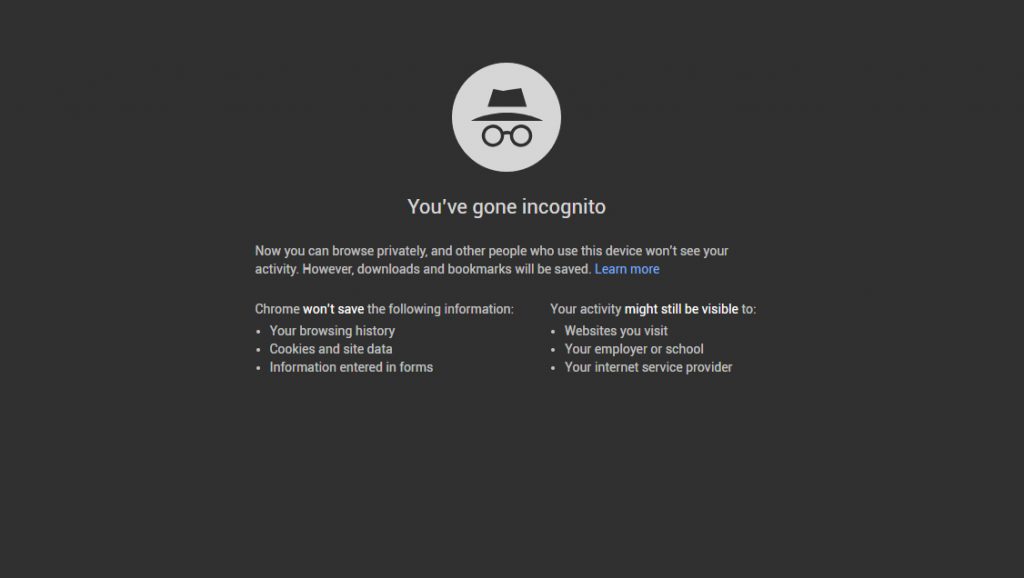Internet security has become a trend in the recent years. People want to hide their presence on the web, delete info about their visits to certain websites, etc. You can find many recommendations about how to secure your web experience using simple (and sometimes complicated) tools. You can also read a lot of stuff about e-mail viruses and other things.
But can you really believe all of those things? Well, in this article we have gathered the most common myths about Internet security.
1. Web Browser’s Incognito mode (aka Private Browsing) makes you completely anonymous

Many users actually believe this to be true. In real life, private browsing is made for convenience rather than actual protection.
Basically, while you’re in the incognito mode, your browser does not keep:
- browsing history
- web form history
- cookies
- temporary Internet files
While deleting cookies can be useful in some cases, your security status will not change all that much if you delete your browsing or download history. It should also go without saying that your ISP can still track you when you’re using incognito mode.
Privatoria VPN gives you the ultimate privacy you desire so much. Change your IP address and encrypt your Internet traffic. Even your ISP can’t track you with our VPN.
With a VPN enabled, your web experience is secured from intruders seeking to gather your private information and sell it to marketing agencies.
2. Changing Mac Address will help to hide your real location
First of all, we should mention that not all devices let you change the Mac address of their network interfaces, as this information is sometimes stored in read-only memory of your network card (both Ethernet and WiFi).
You can try an app that changes your Mac Address but also keep in mind that in most cases Mac Addresses are only visible within your local network (your router coverage) and cannot be viewed outside that network.
More important, however, is the fact that Mac Addresses only defines your network interface (henceforth, the device you are using). Changing the Mac Address will not change your IP address given assigned to you by your ISP. This means whoever is tracking you will still know your location no matter how many times you’ve changed your Mac Address.
3. Viruses are on Windows only
A lot of users hate Windows for attracting too many viruses and change the platform to protect themselves from malware.
In reality, it is possible to write malware for any platform as long as it makes sense financially. In other words, any popular platform automatically becomes a target for virus writers. A great example of this is Android which did not have as many viruses when it first emerged.
This is, however, not the end of the world. Anti-virus programs are not Windows-exclusive. You get an anti-virus for your Android, IOS, Mac and even a Linux device/computer. Some of them do not have a real-time scan option (so-called “on demand” anti-virus programs) but they are still able to offer enough protection.
Something that also has to be taken into account is the cross-platform nature of our computing. This means you can download a Windows viral program on your Mac or Linux machine, transfer it to your Windows machine and the job is done. On-demand antivirus software can prevent that. Therefore, it will be a good idea to check suspicious files you download from the web on your Mac or Linux box prior to transferring them to your Windows machine.
4. You can trust any E-mail from a familiar sender
 Well, this is false.
Well, this is false.
Even if you receive an e-mail from a person you know do not rush to follow containing links or download files attached to it. There are certain types of malware and spyware that can use address book and send stuff without the actual owner’s consent.
You’ve probably heard a lot of stuff both confirming and denying this statement.
Let us get straight to it and confirm that e-mails can indeed contain viruses. The myth about virus-free e-mail was probably been born because of certain e-mail services that have virus protection built it (you can’t attach any executable files to your e-mail).
Another important thing to remember is that websites can hide malware inside Javascript and execute it right in your browser.
5. You are of little interest to intruders if you do not have payment details on your PC
 Some people would actually say this is true as your credit card details can not be stolen from your PC if you do not store them there. Well, that’s correct but there are different types of info that the intruder could be after.
Some people would actually say this is true as your credit card details can not be stolen from your PC if you do not store them there. Well, that’s correct but there are different types of info that the intruder could be after.
A great example is your browsing habits, logins, and passwords to e-mails, social accounts, etc. This may look like nothing to you but your browsing preferences can later be sold to marketing companies that might send annoying ads and e-mails to you.
For that reason, we recommend that you secure your PC at all times. Privatoria complex services help a lot in doing that. An attacker can’t get to you without your real IP address. Even if a hacker does get to you, they won’t be able to make use of web history because it’s all encrypted.
6. VPN automatically means encryption
Most users would assume that all VPN providers offer encryption for their user’s Internet traffic since they provide a VPN service. Encryption, however, is an additional service and requires a completely different level of commitment from the VPN provider. Therefore, you always have to specify if certain VPN providers offer encryption with their service.
Privatoria strives to provide the best experience for users. Therefore, we offer Internet traffic encryption by default for our VPN service.
7. Good password means you’re protected
Nowadays people tend to shorten their passwords and use simple words that they won’t forget very easily. Unfortunately, this is obvious for intruders who will try to guess your password using some of the popular patterns. Therefore, passwords similar to “StrongPassword” may not provide ultimate protection.
Conclusion
The World Wide Web is full of things we wish weren’t there. The Internet is evolving, however, and some bad people will certainly try to take advantage of the users. This is where certain myths arise about what you can and cannot do online. We hope you liked top 5 security myths. To protect yourself online, we recommend to use a bundle of security services.
Secure Yourself with VPN
With VPN you can…
- Hide & change your IP from hackers and spies
- Unblock geo-restricted websites in from many countries (watch Netflix abroad!)
- Protect your personal passwords, bank account & credit card details
- Use Tor without installing any additional software on your device
- Enjoy secure text messaging, voice calls, video calls & data transfer
- Send emails from different IP addresses w/ 256 bit AES e-mail encryption
- Securely store data & messages
- Transfer data w/ 24-hour self-destruction functionality (files will self-destruct if not downloaded by recipient)
Best VPN Service
| Rank | Provider | Price/Month | Go To Website |
|---|---|---|---|
| 1 |  NordVPN Review |
$4.92 |  |
| 2 |  PureVPN Website |
$3.33 |  |
| 3 |  Expressvpn Review |
$8.32 |  |
| 4 |  Vyprvpn Review |
$1.66 |  |
| 5 |  PIA Review |
$2.69 |  |





